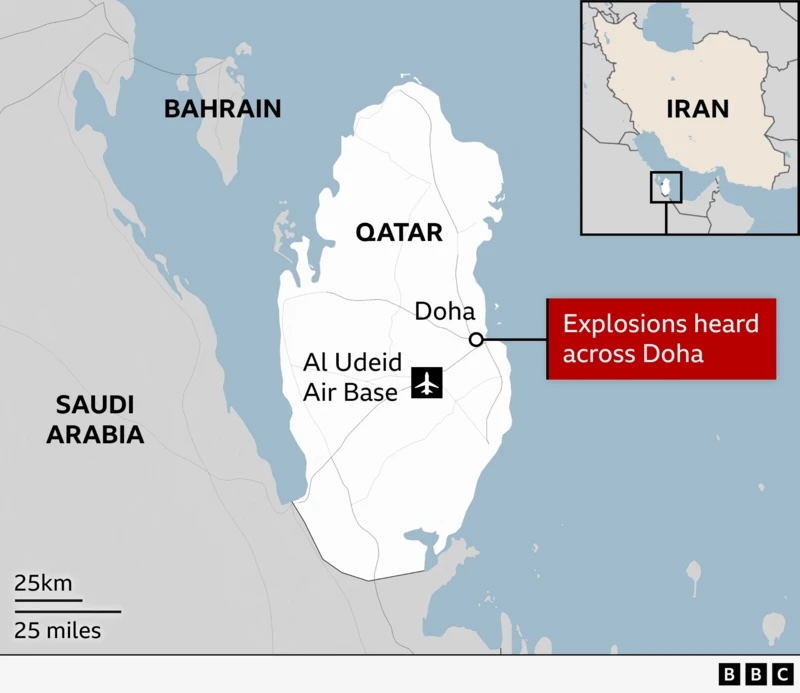
Iran Fires Missiles at US Airbases in Qatar and Iraq in Retaliation for Nuclear Site Bombings » Capital News
June 23, 2025 – Iran has launched a series of ballistic missiles targeting US military installations in Qatar and Iraq, in what it says is direct retaliation for the US bombing of three of its nuclear facilities over the weekend.
The unprecedented escalation deepens an already volatile conflict that began with Israel’s attacks on Iranian sites ten days ago.
Qatar confirmed that the US-run Al Udeid Airbase, the largest American military installation in the Middle East and the forward headquarters of CENTCOM, was the primary target. The Qatari government labelled the missile strike a “flagrant violation” of its sovereignty and warned that it reserves the right to respond. Authorities reported that all incoming missiles were intercepted, with no casualties confirmed at this time.
In the immediate aftermath, Qatar temporarily closed its airspace, and both US and UK embassies advised their citizens to shelter in place as military tensions across the region soared.
The UK’s Defence Minister Luke Pollard, addressing Parliament, confirmed explosions near the Al Udeid base at 7:35 p.m. local time (17:35 BST) and noted that “force protection is at its highest state” across British military installations in the region.
US on High Alert
In Washington, President Donald Trump convened an emergency meeting in the White House Situation Room, joined by his Secretary of Defense and the Chairman of the Joint Chiefs of Staff. A Pentagon official confirmed that Iran launched both short- and medium-range ballistic missiles directly from its territory.
This marks the most direct Iranian strike against American forces since the US-Iran tensions reignited earlier this month.
Trump, who visited the Al Udeid base in May, had told troops during his visit: “As president, my priority is to end conflicts, not start them. But I will never hesitate to wield American power, if it’s necessary, to defend the United States of America or our partners.”
Following Saturday’s US-led bombing of Iran’s Fordow, Natanz, and Esfahan nuclear facilities, Trump had issued a stern warning that any retaliation by Iran would be “met by force far greater.”
While the US is still assessing the full extent of the Iranian missile attack, dozens of aircraft were moved off the Al Udeid tarmac in recent days, suggesting Washington anticipated possible retaliation.
Broader Conflict with Israel
The strikes come as Israel continues its own campaign against Iran, claiming it is targeting Tehran with “unprecedented force.” Israeli officials said they had attacked access routes to the Fordow nuclear facility as well as Evin prison, a notorious detention centre linked to political prisoners and dissidents.
The situation has prompted the US National Security Council to meet daily, with military analysts warning of a looming regional war that could draw in multiple global powers and destabilise critical energy corridors, including the Strait of Hormuz.
Iranian hardliners have celebrated the missile launches as a symbolic and strategic response, although international observers note that so far, Tehran appears to be carefully calibrating its actions to avoid an all-out war with the US.
The Pentagon says it is monitoring the situation closely and promised to provide further updates. While there have been no reported US or coalition casualties, the pressure is mounting on the Trump administration to respond decisively, both to reassure allies and deter further Iranian aggression.
With tensions reaching a boiling point, the world is now watching to see whether this latest exchange marks the peak of hostilities or a dangerous new phase in the US-Iran-Israel conflict.